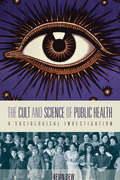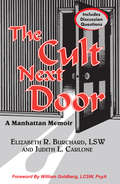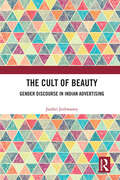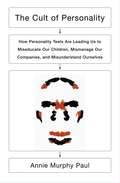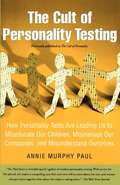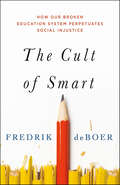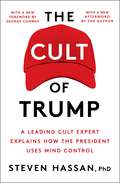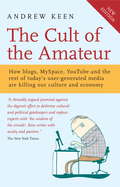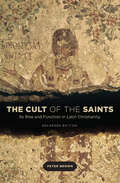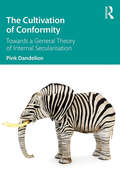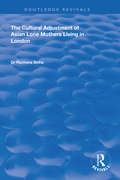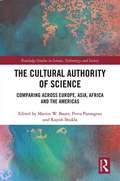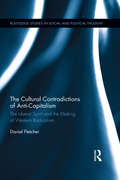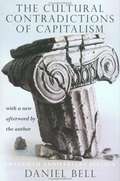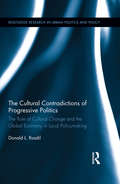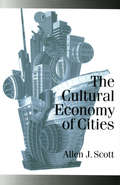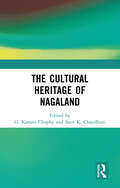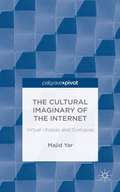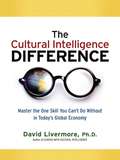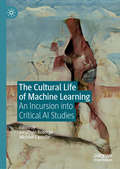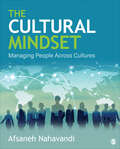- Table View
- List View
The Cult And Science Of Public Health
by Kevin DewIn contemporary manifestations of public health rituals and events, people are being increasingly united around what they hold in common--their material being and humanity. As a cult of humanity, public health provides a moral force in society that replaces 'traditional' religions in times of great diversity or heterogeneity of peoples, activities and desires. This is in contrast to public health's foundation in science, particularly the science of epidemiology. The rigid rules of 'scientific evidence' used to determine the cause of illness and disease can work against the most vulnerable in society by putting sectors of the population, such as underrepresented workers, at a disadvantage. This study focuses on this tension between traditional science and the changing vision articulated within public health (and across many disciplines) that calls for a collective response to uncontrolled capitalism and unremitting globalization, and to the way in which health inequalities and their association with social inequalities provides a political rhetoric that calls for a new redistributive social programme. Drawing on decades of research, the author argues that public health is both a cult and a science of contemporary society.
The Cult Next Door: A True Story of a Suburban Manhattan New Age Cult
by Elizabeth Burchard Judith Carlone William GoldbergDuring Thanksgiving vacation of her freshman year at Swarthmore College (1977), Elizabeth, at her mother's insistence, attended a "stress-reduction" session with a biofeedback technician on staff at a Manhattan psychologist's office. During that first visit, this man filled her ears with prophetic visions of a glorious future--the inheritance of those fortunate few who might choose to accompany him. His confidence and charisma entranced her, and she soon recruited two of her college roommates. When the psychologist fired his assistant two years later, Elizabeth and her mother followed. Over the next decade, this man, a malevolent genius and master of manipulating metaphysical concepts to benefit a self-serving agenda, organized a small, dedicated band of followers. "The Group" evolved into an incestuous family--a cult. Their brainwashed minds became fused with a distinctive, New Age doctrine. A coterie of spiritual "Navy Seals", they scrambled in terror, training to survive the inevitable cataclysm--one man's divine vision of Armageddon. Subsequent to a momentous event in August 1994, with the guru as high priest, "The Black Dog Religion" was born. Elizabeth sank into a pit of despair, darker than she ever could have imagined was possible. From the adolescent gullibility which seduced her astray, to the enlightenment which led her to freedom, you will travel an incredible journey. For anyone who has ever been trapped by a person who would not let them go, within this book lies a message of hope.
The Cult of Beauty: Gender Discourse in Indian Advertising
by Jaishri JethwaneyThis book deconstructs the quintessential Indian woman that the advertising industry portrays across the spectrum by looking at Indian advertisements across multiple brands with a gender lens based on societal and sociological perspectives. It delves into various critical issues like the differences between culture-defined gender roles/expectations and women’s portrayal in the ad narrative, and which product category has consistently portrayed women as sex objects.Drawing insights from a seminal research study and Erving Goffman’s classic book ‘Gender Advertisements’, it traces the journey of three decades, beginning the 1990s – the era of liberalization in India, to map trends and patterns in Indian advertising and presents the perspectives of the creative teams and top managements across Indian and global advertising agencies. It discusses the application of a Gender Sensitivity Barometer (GSB) which the creative teams can use to find out how sensitive or insensitive the ad has been based on pre-determined indicators suggested by the GSB.This book will be useful to students, researchers and faculty working in the field of management, advertising, mass communication, psychology, gender studies and sociology. It will also be an indispensable companion to professionals from the field of advertising and related areas.
The Cult of Mac, 2nd Edition
by Leander Kahney David PieriniIt's been nearly fifteen years since Apple fans raved over the first edition of the critically-acclaimed The Cult of Mac. This long-awaited second edition brings the reader into the world of Apple today while also filling in the missing history since the 2004 edition, including the creation of Apple brand loyalty, the introduction of the iPhone, and the death of Steve Jobs.Apple is a global luxury brand whose products range from mobile phones and tablets to streaming TVs and smart home speakers. Yet despite this dominance, a distinct subculture persists, which celebrates the ways in which Apple products seem to encourage self-expression, identity, and innovation.The beautifully designed second edition of The Cult of Mac takes you inside today's Apple fandom to explore how devotions--new and old--keep the fire burning. Join journalists Leander Kahney and David Pierini as they explore how enthusiastic fans line up for the latest product releases, and how artists pay tribute to Steve Jobs' legacy in sculpture and opera. Learn why some photographers and filmmakers have eschewed traditional gear in favor of iPhone cameras. Discover a community of collectors around the world who spend tens of thousands of dollars to buy, restore, and enshrine Apple artifacts, like the Newton MessagePad and Apple II.Whether you're an Apple fan or just a casual observer, this second edition of The Cult of Mac is sure to reveal more than a few surprises, offering an intimate look at some of the most dedicated members in the Apple community.
The Cult of Personality
by Annie Murphy PaulMillions of Americans take personality tests each year: to get a job, to pursue an education, to settle a legal dispute, to better understand themselves and others. But where did these tests come from, and what are they saying about us? In The Cult of Personality, award-winning psychology writer Annie Murphy Paul reveals the surprising and disturbing story behind the tests that claim to capture human nature. Combining cutting-edge research, engaging reporting, and absorbing history, Paul uncovers the way these allegedly neutral instruments are in fact shaped by the agendas of industry and government. She documents the dangers of their intrusive questions, biased assumptions, and limiting labels. And she exposes the flawed theories and faulty methods that render their results unreliable and invalid. Personality tests, she contends, produce descriptions of people that are nothing like human beings as they actually are: complicated, contradictory, changeable across time and place. The widespread use of these tests has deeply troubling consequences. Students are being consigned to narrow categories even as they're still growing and developing. Workers are having their privacy invaded and their rights trampled. Companies are wasting hundreds of millions of dollars, only to make ill-informed decisions about hiring and promotion. Our judicial system is being undermined by inaccurate evidence. Perhaps most distressing, we are all increasingly implicated in a "cult of personality" that celebrates the superficial over the substantive, the static over the dynamic, the standard and average over the distinctive and unique. Compelling and insightful, this book is an eye-opening account of a collision among the needs of business and bureaucracy, the imperatives of a lucrative and largely unregulated testing industry, and the eternal human desire to make sense of ourselves and each other.
The Cult of Personality Testing
by Annie Murphy PaulThis book tells the surprising and disturbing story of the tests that claim to capture human nature. It goes behind the scenes to discover how personality tests are used in America's companies, its courts, its schools, and in organizations from churches to community centers to dating services. It exposes the serious flaws of personality tests, explaining why their results are often invalid, unreliable, and unfair.
The Cult of Pharmacology: How America Became the World's Most Troubled Drug Culture
by Richard DegrandpreAmerica had a radically different relationship with drugs a century ago. Drug prohibitions were few, and while alcohol was considered a menace, the public regularly consumed substances that are widely demonized today. Heroin was marketed by Bayer Pharmaceuticals, and marijuana was available as a tincture of cannabis sold by Parke Davis and Company. Exploring how this rather benign relationship with psychoactive drugs was transformed into one of confusion and chaos, The Cult of Pharmacology tells the dramatic story of how, as one legal drug after another fell from grace, new pharmaceutical substances took their place. Whether Valium or OxyContin at the pharmacy, cocaine or meth purchased on the street, or alcohol and tobacco from the corner store, drugs and drug use proliferated in twentieth-century America despite an escalating war on "drugs. " Richard DeGrandpre, a past fellow of the National Institute on Drug Abuse and author of the best-selling book Ritalin Nation, delivers a remarkably original interpretation of drugs by examining the seductive but ill-fated belief that they are chemically predestined to be either good or evil. He argues that the determination to treat the medically sanctioned use of drugs such as Miltown or Seconal separately from the illicit use of substances like heroin or ecstasy has blinded America to how drugs are transformed by the manner in which a culture deals with them. Bringing forth a wealth of scientific research showing the powerful influence of social and psychological factors on how the brain is affected by drugs, DeGrandpre demonstrates that psychoactive substances are not angels or demons irrespective of why, how, or by whom they are used. The Cult of Pharmacology is a bold and necessary new account of America's complex relationship with drugs.
The Cult of Smart: How Our Broken Education System Perpetuates Social Injustice
by Fredrik deBoerNamed one of Vulture’s Top 10 Best Books of 2020!Leftist firebrand Fredrik deBoer exposes the lie at the heart of our educational system and demands top-to-bottom reform.Everyone agrees that education is the key to creating a more just and equal world, and that our schools are broken and failing. Proposed reforms variously target incompetent teachers, corrupt union practices, or outdated curricula, but no one acknowledges a scientifically-proven fact that we all understand intuitively: Academic potential varies between individuals, and cannot be dramatically improved. In The Cult of Smart, educator and outspoken leftist Fredrik deBoer exposes this omission as the central flaw of our entire society, which has created and perpetuated an unjust class structure based on intellectual ability.Since cognitive talent varies from person to person, our education system can never create equal opportunity for all. Instead, it teaches our children that hierarchy and competition are natural, and that human value should be based on intelligence. These ideas are counter to everything that the left believes, but until they acknowledge the existence of individual cognitive differences, progressives remain complicit in keeping the status quo in place.This passionate, voice-driven manifesto demands that we embrace a new goal for education: equality of outcomes. We must create a world that has a place for everyone, not just the academically talented. But we’ll never achieve this dream until the Cult of Smart is destroyed.
The Cult of Trump: A Leading Cult Expert Explains How the President Uses Mind Control
by Steven Hassan*As featured in the streaming documentary #UNTRUTH—now with a new foreword by George Conway and an afterword by the author* A masterful and eye-opening examination of Trump and the coercive control tactics he uses to build a fanatical devotion in his supporters written by &“an authority on breaking away from cults…an argument that…bears consideration as the next election cycle heats up&” (Kirkus Reviews). Since the 2016 election, Donald Trump&’s behavior has become both more disturbing and yet increasingly familiar. He relies on phrases like, &“fake news,&” &“build the wall,&” and continues to spread the divisive mentality of us-vs.-them. He lies constantly, has no conscience, never admits when he is wrong, and projects all of his shortcomings on to others. He has become more authoritarian, more outrageous, and yet many of his followers remain blindly devoted. Scott Adams, the creator of Dilbert and a major Trump supporter, calls him one of the most persuasive people living. His need to squash alternate information and his insistence of constant ego stroking are all characteristics of other famous leaders—cult leaders. In The Cult of Trump, mind control and licensed mental health expert Steven Hassan draws parallels between our current president and people like Jim Jones, David Koresh, Ron Hubbard, and Sun Myung Moon, arguing that this presidency is in many ways like a destructive cult. He specifically details the ways in which people are influenced through an array of social psychology methods and how they become fiercely loyal and obedient. Hassan was a former &“Moonie&” himself, and he presents a &“thoughtful and well-researched analysis of some of the most puzzling aspects of the current presidency, including the remarkable passivity of fellow Republicans [and] the gross pandering of many members of the press&” (Thomas G. Gutheil, MD and professor of psychiatry, Harvard Medical School). The Cult of Trump is an accessible and in-depth analysis of the president, showing that under the right circumstances, even sane, rational, well-adjusted people can be persuaded to believe the most outrageous ideas. &“This book is a must for anyone who wants to understand the current political climate&” (Judith Stevens-Long, PhD and author of Living Well, Dying Well).
The Cult of the Amateur: How blogs, MySpace, YouTube and the rest of today's user-generated media are killing our culture and economy
by Andrew KeenA new, updated edition, with a new foreword of Andrew Keen's witty and provocative polemic against the rise of user-generated content and the anything goes standards of much online publishing, which set the blogosphere and media alight on publication. Dubbed the 'anti-christ' of Silicon Valley and a dot-com apostate Andrew Keen is the leading contemporary critic of the Internet. and The Cult of the Amateur is a scathing attack on the mad utopians of Web 2.0 and the wisdom of the crowd. Keen argues that much of the content filling up YouTube, MySpace, and blogs is just an endless digital forest of mediocrity which, unconstrained by professional standards or editorial filters, can alter public debate and manipulate public opinion.
The Cult of the Luxury Brand: Inside Asia's Love Affair with Luxury
by Paul Husband Radha ChadhaThis is a new and updated edition of this acclaimed first business book on the powerful, simple yet subtle approach to positive change in people, teams and organisations. Used around the world by a wide range of people, professions and organisations, the first edition has now sold nearly 10,000 copies and been translated into 7 languages. Including new chapters reflecting the increasing importance of coaching and the solutions focus movement in the business environment, this wide-ranging book is filled with all the most important ideas, case examples and practical tips for managers, facilitators and consultants. Proven in many fields and with a distinguished intellectual heritage, The Solutions Focus provides a simple and direct route to progress in your organisation. It focuses on: solutions - not problems; in between: the action is in the interaction; make use of what's there; possibilities - past, present and future; and language. Every case is different. The trouble with traditional approaches to people problems is that they assume a straightforward relationship between cause and effect, between a problem and its solution. A solutions-focused approach sidesteps the search for the causes of a problem and heads straight for the solution, showing you how to envisage your preferred future and quickly takes steps forward. The authors present a set of practical techniques, including specific forms of questioning that lead to immediate action and results. They show how to identify what is working in your organisation and amplify it to make useful changes; to focus on what is possible rather than what is intractable and how to be solution focused, not solution forced.
The Cult of the Saints: Its Rise and Function in Latin Christianity, Enlarged Edition
by Peter BrownA new edition of the &“brilliantly original and highly sophisticated&” study of saint worship after the fall of the Roman Empire (Library Journal). In this groundbreaking work, Peter Brown explores how the worship of saints and their corporeal remains became central to religious life in Western Europe after the fall of the Roman Empire. During this period, earthly remnants served as a heavenly connection, and their veneration is a fascinating window into the cultural mood of a region in transition. Brown challenges the long-held two-tier idea of religion that separated the religious practices of the sophisticated elites from those of the superstitious masses, instead arguing that the cult of the saints crossed boundaries and played a dynamic part in both the Christian faith and the larger world of late antiquity. He shows how men and women living in harsh and sometimes barbaric times relied upon the holy dead to obtain justice, forgiveness, and power, and how a single sainted hair could inspire great thinkers and great artists. An essential text by one of the foremost scholars of European history, this expanded edition includes a new preface from Brown, which presents new ideas based on subsequent scholarship. &“Informative…demonstrates once again Brown&’s genius for sharing with his readers the fruits of not only his own painstaking and meticulous scholarship but also his penetrating understanding of the evolution of Western culture as a whole.&”—Religious Studies
The Cultivation of Conformity: Towards a General Theory of Internal Secularisation
by Pink DandelionThis book explores the inter-relationship between religious groups and wider society and examines the way religious groups change in relation to societal norms, potentially to the point of undergoing processes of ‘internal secularisation’ within secular and secularist cultures. Received sociological wisdom suggests that over time religious groups moderate their claims. This comes with the potential loss of new adherents, for theorists of secularisation suggest unique or universal, rather than moderate, truth claims appear attractive to would-be recruits. At the same time, religious groups need to appear equivalent, in terms of harmlessness, to state-sanctioned religious expression in order to secure rights. Thus, religious organisations face a perpetual conundrum. Using British Quakers as a case study as they moved from a counter-cultural group to an accepted and accepting part of twentieth- and twenty-first-century society, the author builds on models of religion and non-religion in terms of flows and explores the consequences of religious assimilation when the process of constructing both distinctive appeal and ‘harmlessness’ in pursuit of rights is played out in a secular culture. A major contribution to the sociology of religion, The Cultivation of Conformity presents a new theory of internal secularisation as the ultimate stage of the cultivation of conformity, and a model of the way sects and society inter-relate.
The Cultural Adjustment of Asian Lone Mothers Living in London (Routledge Revivals)
by Rachana SinhaFirst published in 1998, this insightful volume aims to explore how 90 Indian and African single mothers in 1993 London resolve the dual challenges of single parenthood and their ethnic origins, along with a comparison with their British counterparts. This is one of only a few studies devoted exclusively to Asian lone mothers in Britain and sheds light on the problems encountered by a group largely ignored by researchers to date. Rachana Sinha establishes the impact of differences in family values on issues of marriage, women’s status and lone parenthood and brings to light some of the mothers’ cultural and psychological adjustments to these values and life in London. The women’s experiences of lone parenthood are shown through their relationships with the father, their family and friends and with contacts with social organizations. Sinha ends the study with suggestions and implications for social policy drawn from her findings.
The Cultural Authority of Science: Comparing across Europe, Asia, Africa and the Americas (Routledge Studies in Science, Technology and Society)
by Rajesh Shukla Martin W Bauer Petra PansegrauThe cultural authority of science is the authority that is granted to science in any particular context. This authority is as much a matter of image and perceived legitimacy as of statutory guarantee. However, while authority can be charismatic, based on tradition or based on competence, we would assume that science aims to be an authority of competence. To what extent does science have the last word, or stand above opinion on public issues? This Indo-European led collaboration aims to map the cultural authority of science, and to construct a system of indicators to observe this ‘science culture’ based on artefacts (science news analysis) and espoused beliefs and evaluations (public attitude data). Indeed, through a series of studies the authors examine the cultural authority of science in light of the challenges posed by European, Asian, African and American developments and debates. In particular, two main ideas are examined: the ‘Lighthouse’ model, whereby science is shining into a stormy sea of ignorance and mistrust; and the ‘Bungee Jump’ model, which demonstrates how science occasionally experiences a rough ride against a backdrop of goodwill. Presenting expertise in discourse analysis, computer-assisted text analysis and largescale survey analysis, The Cultural Authority of Science will be of interest to a global audience concerned with the standing of science in society. In particular, it may appeal to scholars and students of fields such as sociology of science, science communication, science studies, scientometrics, innovation studies and social psychology.
The Cultural Contradictions of Anti-Capitalism: The Liberal Spirit and the Making of Western Radicalism (Routledge Studies in Social and Political Thought)
by Daniel FletcherDoes contemporary anti-capitalism tend towards, as Slavoj Žižek believes, nihilism, or does it tend towards, as Michael Hardt and Antonio Negri believe, true egalitarian freedom? Within The Cultural Contradictions of Anti-Capitalism, Fletcher presents an answer that manages to tend towards both simultaneously. In entering into contemporary debates on radicalism, this innovative volume proposes a revised conception of Hardt and Negri’s philosophy of emancipatory desire. Indeed, Fletcher reassesses Hardt and Negri’s history of Western radicalism and challenges their notion of an alter-modernity break from bourgeois modernity. In addition to this, this title proposes the idea of Western anti-capitalism as a spirit within a spirit, exploring how anti-capitalist movements in the West pose a genuine challenge to the capitalist order while remaining dependent on liberalist assumptions about the emancipatory individual. Inspired by post-structuralism and rejecting both revolutionary transcendence and notions of an underlying desiring purity, The Cultural Contradictions of Anti-Capitalism offers new insight into how liberal capitalist society persistently produces its own forms of resistance against itself. This book will appeal to graduate and postgraduate students interested in fields such as: Sociology, Politics, International Relations, Cultural Studies, History, and Philosophy.
The Cultural Contradictions of Capitalism (20th Anniversary Edition)
by Daniel BellThis classic analysis of Western liberal capitalist society contends that capitalism and the culture it creates harbors the seeds of its own downfall by creating a need among successful people for personal gratification a need that corrodes the work ethic that led to their success in the first place.
The Cultural Contradictions of Progressive Politics: The Role of Cultural Change and the Global Economy in Local Policymaking (Routledge Research in Urban Politics and Policy)
by Donald L. RosdilWhy do some U.S. cities like Seattle and Boston impose social exactions and sustainability targets on private investment while others like Las Vegas and Houston offer property tax and fee remissions to business, tolerate environmentally hazardous activities such as oil drilling, and express skepticism even about recycling mandates? The behavior of the former cities appears especially puzzling in view of globalization processes that seemingly offer many more options to mobile capital and expose cities’ vulnerability to private investment decisions. Cultural Contradictions examines the paradoxical finding that some U.S. cities can impose burdensome regulations and extract social and environmental contributions from the private sector despite an apparently weak bargaining position. It usescultural change and the growth of non-traditional subcultures to explain why cities adopt these progressive policies. Responding to the urban policy literature’s tendency to prioritize economic considerations over other kinds of causal factors, the book demonstrates the joint impact of culture and economics in encouraging policy outcomes which emphasize social justice, human rights, and environmental sustainability in large U.S. cities. The book makes several specific contributions to urban literature. First, it argues that cities in which nontraditional cultural beliefs and practices thrive and which are strongly linked to dynamic economic sectors such as information services, professional, scientific and technical services, financial services, and education and health care services are especially likely to adopt progressive policies. It establishes this claim using both statistical analysis of large-N city samples and a closer investigation of four case studies. Second, it reveals how progressive policies are a plausible response to psychological concerns associated with unconventional ways of life and the nature of postindustrial society. Finally, the book indicates how these new ways of life and postindustrial economic sectors grow in mutually reinforcing ways in order to make these policies acceptable to local economic elites and therefore favorable to the city’s future development.
The Cultural Economy of Cities: Essays on the Geography of Image-Producing Industries (Published in association with Theory, Culture & Society)
by Allen J ScottCulture is big business. It is at the root of many urban regeneration schemes throughout the world, yet the economy of culture is under-theorized and under-developed. In this wide-ranging and penetrating volume, the economic logic and structure of the modern cultural industries is explained. The connection between cultural production and urban-industrial concentration is demonstrated and the book shows why global cities are the homelands of the modern cultural industries. This book covers many sectors of cultural economy, from craft industries such as clothing and furniture, to modern media industries such as cinema and music recording. The role of the global city as a source of creative and innovative energy is examined in detail, with particular attention paid to Paris and Los Angeles.
The Cultural Heritage of Nagaland
by G. Kanato Chophy Sarit K. ChaudhuriThis volume gives an in-depth account of cultural heritage of Nagaland covering important themes like cultural beliefs, traditional knowledge, material culture, and social institutions. Contributors from diverse disciplines and backgrounds have delved into the cultural heritage of the state’s variegated tribes. Nagaland a hilly state in North-East India had been the centre of British colonialism and American Baptist mission. This cultural contact is significantly reflected in the socio-cultural life, and the contributors have shed light on the continuities and changes. This volume highlights the multiplicity of cultural traditions that are specific to various tribes inhabiting sixteen districts of Nagaland, since their experiences of modernity and cultural contact with ‘others’ have been diverse. The contributors have mainly focussed on the cultural heritage of the majority Naga tribes, but other tribes like the Kukis and Kacharis are part and parcel of the cultural melting pot of Nagaland, and this volume in a way underscores the cultural exchange and interactions. Taylor & Francis does not sell or distribute the print version of this book in India, Pakistan, Nepal, Bhutan, Bangladesh and Sri Lanka.
The Cultural Imaginary of the Internet: Virtual Utopias and Dystopias
by Majid YarContemporary culture offer contradictory views of the internet and new media technologies, painting them in extremes of optimistic enthusiasm and pessimistic concern. This book explores such representations, uncovering the roots of our cultural responses to the internet, centred upon a profoundly ambivalent reaction to technological modernity.
The Cultural Intelligence Difference -Special eBook Edition: Master the One Skill You Can't Do Without in Today's Global Economy
by David LivermoreLearn how to master the one skill you can&’t do without in today&’s global economy.As an award-winning author and global business leader, David Livermore applies his social science and cultural intelligence (CQ) expertise to teach others how to thrive in increasingly multicultural workplaces and a globalized world. Now, in this essential book, he shows you how to leverage the benefits of cultural intelligence for themselves--including improved decision-making, negotiation, networking, and leadership skills--to gain a crucial advantage in the crowded job market.In The Cultural Intelligence Difference, you&’ll explore:customized strategies for improving interactions with people from diverse cultures,new findings on the bottom-line benefits of cultural intelligence,and many examples of major organizations that use CQ to achieve success.Most people know that some basic cultural sensitivity is important. But few have developed the deep cultural intelligence needed to truly bridge the cultural gaps that exist in every workplace.The Cultural Intelligence Difference delivers a powerful tool for navigating today's work world with finesse--and success.
The Cultural Life of Machine Learning: An Incursion into Critical AI Studies
by Jonathan Roberge Michael CastelleThis book brings together the work of historians and sociologists with perspectives from media studies, communication studies, cultural studies, and information studies to address the origins, practices, and possible futures of contemporary machine learning. From its foundations in 1950s and 1960s pattern recognition and neural network research to the modern-day social and technological dramas of DeepMind’s AlphaGo, predictive political forecasting, and the governmentality of extractive logistics, machine learning has become controversial precisely because of its increased embeddedness and agency in our everyday lives. How can we disentangle the history of machine learning from conventional histories of artificial intelligence? How can machinic agents’ capacity for novelty be theorized? Can reform initiatives for fairness and equity in AI and machine learning be realized, or are they doomed to cooptation and failure? And just what kind of “learning” does machine learning truly represent? We empirically address these questions and more to provide a baseline for future research.Chapter 2 is available open access under a Creative Commons Attribution 4.0 International License via link.springer.com.
The Cultural Logic of Politics in Mainland China and Taiwan
by Tianjian ShiTianjian Shi shows how cultural norms affect political attitudes and behavior through two causal pathways, one at the individual level and one at the community level. Focusing on two key norms - definition of self-interest and orientation to authority - he tests the theory with multiple surveys conducted in mainland China and Taiwan. Shi employs multi-level statistical analysis to show how, in these two very different political systems, similar norms exert similar kinds of influence on political trust, understanding of democracy, forms of political participation, and tolerance for protest. The approach helps to explain the resilience of authoritarian politics in China and the dissatisfaction of many Taiwan residents with democratic institutions. Aiming to place the study of political culture on a new theoretical and methodological foundation, Shi argues that a truly comparative social science must understand how culturally embedded norms influence decision making.
The Cultural Mindset: Managing People Across Cultures
by Afsaneh NahavandiThe phenomenon of global organizations reminds us that cross-cultural management is more prevalent than ever. While it may not be possible to develop in-depth knowledge of all cultures, a person can develop a way of thinking where they integrate culture in all of their deliberations, decisions, and behaviors. Such an approach is transformative and involves adopting a cultural mindset, understanding culture’s power as a frame of reference, and developing a new way of thinking. The book Cross-Cultural Management: The Cultural Mindset is based on Dr. Nahavandi’s years of teaching, researching, and consulting with many businesses on cross-cultural issues. Built around a think-know-do model, the text enables readers to adopt a cultural mindset that will effectively guide their thinking and behavior as future managers. Through case studies and self-assessments, the book allows students to develop a broader view of culture that is beyond learning skills and competencies. Additionally, by focusing on culture in general, the book allows readers to address both national cultural issues, such as how to work in another country or manage a multi-national team, and diversity issues, such as the glass ceiling or discrimination in the workplace. The key underlying theme for both topics is how culture, national or group-related, impacts our perspective – what we value, how we think, how we behave, and how we manage people effectively. Each chapter will include a focus on both informational and transformational learning through: · Cases and examples that will question assumptions and emphasize applicability · Self-assessments to make the concepts personal and relevant, and encourage self-reflection · Examples to help students understand those concepts · Specific exercises and/or reflections to help students apply information to their own personal and professional life
